From Black Mirror to American Housewife, TV Takes on Female Frenemies
David Dettmann/Netflix TV Features Black Mirror
From Mean Girls and Gossip Girl to Girls, Hollywood has become keenly aware of the backstabbing and #sorrynotsorrys that can be all-too-real features of female friendships. But these stories of frenemies are usually dropped by the time the characters stop being—mentally, if not physically—well, girls.
There are outliers on TV, like Jane (Gina Rodriguez) and Petra (Yael Grobglas) on the CW’s Jane the Virgin, who have agreed that they can respect each other—without necessarily having to get along—in order to function as members of that telenovela’s increasingly complicated extended family. But most adult female friendships on the small screen usually fall into one of two camps: They’re either mutually respectful besties, who may have their ups and down but are always there for each other, or they’re sworn enemies who despise each other for some reason (OK, usually it involves a man), but who, over the course of the series, begin to respect and even rely on each other.
Any actual woman will tell you how simplistic both of those notions are.
“I think there are different levels of frenemies among adult women,” says Nicole Zangara, a Scottsdale, Ariz.-based licensed social worker and author of Surviving Female Friendships: The Good, The Bad, and The Ugly. “We may work with women we don’t especially like or get along with, yet because we want to be professional, we make it work. Or say you have a group of friends, and one of the women and you do not get along, you have to figure out a way to move past your feelings if you still want to see [this] group of friends at various events.”
While it’s not the healthiest idea to promote, recent TV programming has at least been honest about the fact that adult female frenemies live among us. The new ABC series American Housewife, which premiered earlier this month, follows Katy Mixon’s Katie Otto, a normal-sized woman stuck in a world of air-kissing, green juice-drinking, size zero yoga moms who talk in a modern-day Orwellian doublespeak of insults and side-eyes. And the lead isn’t necessarily any better. The first episode ends with Katie throwing shade at her new neighbor as soon as she’s done smiling politely at the eager woman’s misguided attempts to start a friendship—a character she and her friends had earlier mocked because she wasn’t like them.
The new season of technology-driven series Black Mirror, on Netflix today, takes things one step further with the episode “Nosedive.” The episode explores the cruel reality that social media and its world of FOMO (“fear of missing out,” for the uninitiated) and fake friendships aren’t just for bullying teenagers who want to make sure you know you weren’t included in the slumber party invite. It follows Lacie Pound (Bryce Dallas Howard), an insecure woman living in a society so tethered to the approval of others’ technological “likes” and “hearts” that she practices looking gracious in the bathroom mirror—hoping all the while that a reunion with her beautiful and awful childhood friend (Alice Eve) will give her the perfectly filtered life she wants. It’s a humorous story, yes, but it’s not too distant from our own reality, in which it’s not uncommon to care about the number of one’s Instagram followers or stay in contact with someone who didn’t invite you to that slumber party a decade ago. (The fact that this episode is co-written by Rashida Jones and Mike Schur, who were involved in bringing one of TV’s best female friendships to fruition on NBC’s Parks and Recreation, should not go unnoticed).
“Social media definitely plays a major role in our friendships and we may hold on to unhealthy or even toxic friends because it is so easy to stay in touch with just about anyone these days,” Zangara says. “I think there’s some embarrassment or even shame when it comes to social media and feeling pressure to display the best parts of ourselves, and then feeling ‘less than’ when we see friends of ours doing these amazing things.”
She adds that some women, like Lacie in Black Mirror, stay in touch with ex-friends simply to keep tabs on them the way they would with a former significant other, and that “many women struggle letting go of unhealthy/toxic friendships because they feel this need to maintain the friendship. Maybe there’s fear of meeting new people or the idea of making new friends is overwhelming?”
This fear can be seen both on- and off-screen. Last summer, journalist Ann Friedman discussed the struggles of making new female friends after testing Hey! VINA, an app that she describes as “essentially Tinder for finding female friendship.” True loyalty, like the friendship between Fiona (Emmy Rossum) and Veronica (Shanola Hampton) on Showtime’s Shameless or Issa (Issa Rae) and Molly (Yvonne Orjli) in HBO’s Insecure, is hard to cultivate after years of detaching yourself from the barnacles of bad friends.
Even watching reruns of Sex and the City can make a viewer wonder how these four very different New Yorkers actually remained close friends throughout all those years without killing each other. Perhaps it wasn’t just their wardrobes that were aspirational.